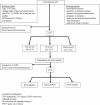Plant-based diets and cardiovascular risk factors: a comparison of flexitarians, vegans and omnivores in a cross-sectional study
- PMID: 38347653
- PMCID: PMC10860304
- DOI: 10.1186/s40795-024-00839-9
Plant-based diets and cardiovascular risk factors: a comparison of flexitarians, vegans and omnivores in a cross-sectional study
Abstract
Background: The growing trend towards conscious and sustainable dietary choices has led to increased adoption of flexitarian diets, characterised by plant-based eating habits with occasional consumption of meat and processed meat products. However, the cardiovascular disease (CVD) risk factors associated with flexitarian diets compared to both vegans and omnivores remain underexplored.
Methods: In this cross-sectional study, 94 healthy participants aged 25-45 years, categorized into long-term flexitarians (FXs ≤ 50 g/day of meat and meat products, n = 32), vegans (Vs, no animal products, n = 33), and omnivores (OMNs ≥ 170 g/day of meat and meat products, n = 29) were included. Various CVD risk factors were measured, including fasting blood samples for metabolic biomarkers, body composition analysis via bioimpedance, blood pressure measurements, arterial stiffness evaluated through pulse wave velocity (PWV) and metabolic syndrome (MetS) severity was determined using browser-based calculations (MetS-scores). Dietary intake was assessed using a Food Frequency Questionnaire (FFQ), diet quality was calculated with the Healthy Eating Index-flexible (HEI-Flex), while physical activity levels were recorded using the validated Freiburger questionnaire.
Results: The data showed that FXs and Vs had more beneficial levels of insulin, triglycerides, total cholesterol, and LDL cholesterol compared to OMNs. Notably, FXs revealed the most favorable MetS-score results based on both BMI and waistline, and better PWV values than Vs and OMNs. In addition, FXs and Vs reported higher intake rates of vegetables, fruit, nuts/seeds and plant-based milk alternatives.
Conclusion: The flexitarian diet appears to confer cardiovascular benefits. While Vs had the most favorable results overall, this study supports that reducing meat and processed meat products intake, as in flexitarianism, may contribute to CVD risk factor advantages.
Keywords: CVD; Cardiovascular disease risk factors; Cholesterol; Flexitarians; HEI-Flex; LDL; Metabolic syndrom severity score; Plant-based diet; Pulse wave velocity; Vegans.
© 2024. The Author(s).
Conflict of interest statement
The authors declare no conflict of interests.
Figures
References
-
- Willett W, Rockström J, Loken B, Springmann M, Lang T, Vermeulen S et al. Food in the Anthropocene: the EAT–Lancet Commission on healthy diets from sustainable food systems. The Lancet. 2. Februar 2019; 393(10170):447–92. https://www.thelancet.com/journals/lancet/article/PIIS0140-6736(18)31788-4/abstract. - PubMed
-
- Ipsos Research. Diets Around the World: an Exploration., 2018. https://www.ipsos.com/en/diets-around-world-exploration.
-
- Derbyshire EJ. Flexitarian diets and Health: a review of the evidence-based literature. Front Nutr 6 Januar 2017; 3. https://www.ncbi.nlm.nih.gov/pmc/articles/PMC5216044/. - PMC - PubMed
-
- Malek L, Umberger W. How flexible are flexitarians? Examining diversity in dietary patterns, motivations and future intentions. Clean Responsible Consum 1 Oct. 2021;3:100038. doi: 10.1016/j.clrc.2021.100038. - DOI
-
- The Lancet.,. Cardiovascular disease risk factors and mortality around the world. https://www.thelancet.com/infographics-do/cardiovascular-disease-risk.
LinkOut - more resources
Full Text Sources


